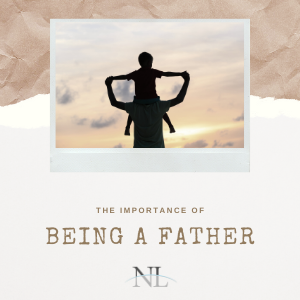The Importance of Being a Father

Today in America, we see a clear decline of our societal foundations. David Popenoe wrote in his book Families Without Fathers, “The past three decades have seen a steep rise in crime, declining interpersonal and political trust, growing personal greed, deteriorating communities, and increasing confusion over moral issues.”
People no longer conduct themselves according to the virtues of honesty, self-sacrifice, and personal responsibility. In our ever-growing pursuit of the self (self-expression, self-development, self-actualization, and self-fulfillment) we see a steady decline in a sense of commitment and obligation to others.
At the heart of the problem lies an erosion of personal relationships. People no longer trust others, no longer have deep relationships with extended family, and lack community ties. The decline of fatherhood and marriage directly harm the type of environment considered ideal for childrearing. The family—which consists of an enduring two-parent family engaging regularly in activities together, with many of its own routines and traditions, and providing a great deal of quality time spent between adults and children—is the seedbed of those civic and moral virtues our culture is losing.
Children are not born with virtues like honesty and self-sacrifice. These virtues must be purposefully taught and reinforced through emotionally close personal relationships and good role modeling. Let them see your virtues and character in an authentic manner. It is ok for them to see you process through tough decisions of character.
A question that begs to be asked is: What Godly virtues am I modeling to my children? David Papenoe shares a common cultural belief that, “A man cannot pledge himself totally to the corporation and still have time properly to raise a family.” This is a sentiment that has been expressed in our culture. How does a father balance the need for providing (work), marriage, and family, with his own personal needs?
Popeno states that, “Men tend to view marriage and childrearing as a single package.” Unfortunately, more than three out of five divorcing couples have at least one child. This impacts everyone in the family, and can have long lasting impact on the healthy attachment style of children. The single most important modeling is for mom and dad to have a growing intimate relationship.
“The odds that a child today will witness the divorce of his or her parents are twice as great as a generation ago, climbing from about one in four to one in two.” (Popeno) This underscores the need for a father/child relationship that is healthy.
Another question is: Am I building a deep emotionally close relationship with my children at an early age (before 11)? “The total time that parents spend with their children has decreased over the past few decades.” (Popeno) If present trends continue, the future of marriage does not appear bright. Only a minority of children born today are likely to grow up in an intact, two-parent family. “The odds that a child today will witness the divorce of his or her parents are twice as great as a generation ago, climbing from about one in four to one in two.” (Popeno) This again underscores the need for an emotionally healthy attachment with father’s and their children.
A final question you must ask yourself is: What do I need to do to begin to change/grow this kind of a (emotionally close personal bond) relationship with my wife and children? Here are some suggestions:
- Spend one-on-one quality time with each of your children and establish a personal and emotionally supportive relationship with them.
- Play with your children and show them how to have good, clean fun. Laugh and play games with them.
- Know their unique personality and love language, so that you can communicate heartfelt love they can receive. This teaches them how to do that with their children by how you interact with them.
- Encourage them to experience things they have an interest in. Teach them about the enjoyment of learning through trial and error, this will help them develop a can-do belief in themselves.
Without a doubt, fathers have a vital role in the family, a responsibility that is not easily replaced. Fatherhood is not effortless, and you will make many mistakes along the way. Don’t let fear of making mistakes keep you from growing as a father. Frank Wilczek says, “If you don’t make mistakes, you’re not working on hard enough problems. And that’s a big mistake.”
Take another moment and think about these 3 questions:
- What Godly virtues am I modeling to my children?
- Am I building a deep emotionally close relationship with my children at an early age (before 11)?
- What do I need to do to begin to change/grow this (emotionally close personal bond) kind of a relationship with my wife and children?
As you ponder these questions, write down 3 action steps you can take this week to grow in your relationship with your family. This Father’s Day, be encouraged that your efforts are not unnoticed or unimportant.
-Quotes from Families without Fathers and Life without Father by David Popenoe
Recommended reading:
-The Love Languages by Gary Chapman
-Parenting Kids with Love and Logic by Faye and Cline
